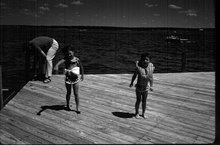recently I was opining on what sort of person is Marilynne Robinson (author of Gilead), and here are two intervew questions (and responses) excerpted from a longer interview, which can be found here.
Q: John Ames, the Congregational minister in the book, is a very theological thinker, and you have mentioned your own interest in theology. If you had to explain it to someone, what is theology and what does it mean to think theologically?
A: It's a difficult thing to describe theology, what it means and how it disciplines thinking. Certainly, theology is the level at which the highest inquiry into meaning and ethics and beauty coincides with the largest-scale imagination of the nature of reality itself. Often, when I want to read something that is satisfying to me as theology, what I actually read is string theory, or something like that -- popularizations, inevitably, of scientific cosmologies -- because their description of the scale of things and the intrinsic, astonishing character of reality coincides very beautifully with the most ambitious theology. It is thinking at that scale, and it is thinking that is invested with meaning in a humanly evocative form. That's theology.
Q: Is there a connection to poetry, too? John Ames is also steeped in the religious poets, and he mentions John Donne and George Herbert throughout the novel.
A: I think the connection between poetry and theology, which is profound in Western tradition -- there is a great deal of wonderful religious poetry -- both poetry and theology push conventional definitions and explore perceptions that might be ignored or passed off as conventional, but when they are pressed yield much larger meanings, seem to be part of a much larger system of reality. The assumption behind any theology that I've ever been familiar with is that there is a profound beauty in being, simply in itself. Poetry, at least traditionally, has been an educing of the beauty of language, the beauty of experience, the beauty of the working of the mind, and so on. The pastor does, indeed, appreciate it. One of the things that is nice about these old pastors -- they were young at the time -- who went into the Middle West is that they were real humanists. They were often linguists, for example, and the schools that they established were then, as they are now, real liberal arts colleges where people studied the humanities in a very broad sense. I think that should be reflected in his mind; appropriately, it is.
skip to main |
skip to sidebar


© 2007 Shannon Halley


c. 1939
Everything around us, dead or alive, in the eyes of a crazy photographer mysteriously takes on many variations, so that a seemingly dead object comes to life through light… --Josef Sudek, on lyricism
There is a street named Asja Lacis street, after her who, as engineer, cut through the author...
on redemption
“Collecting is the redemption of things which is to complement the redemption of man...The collector’s passion, on the other hand, is not only unsystematic but borders on the chaotic, not so much because it is a passion as because it is not primarily kindled by the quality of the object--something that is classifiable--but is inflamed by its “genuineness,” its uniqueness, something that defies any systematic classification. (Arendt, Illuminations: Walter Benjamin Essays and Reflections, 44)

About Me
- N.
- Shannon Leigh Halley

© 2007 Shannon Halley

who I am reading...
Selected Bibliography
Walter Benjamin, The Arcades Project; Illuminations;
Hannah Arendt, ed. New York: Schocken Books, 1969;
Roland Barthes, Camera Lucida: Reflections on Photography (New York: Hill and Wang, 1981);
Anna Farova, Josef Sudek, Poet of Prague: a photographer's life / biographical profile. New York: Aperature Books, c 1992;
Susan A. Handelman, (f)ragments of Redemption: Jewish Thought and Literary Theory in Benjamin, Scholem and Levinas. Bloomington: Indiana University Press, 2001;
Stephen Mitchell, ed. and Robert Hass, transl. Selected Poems of Rainer Maria Rilke;
Susan Buck-Morss, The Dialectics of Seeing: Walter Benjamin and the Arcades Project. Cambridge: MIT Press, 1989;
Marianne Hirsch, Family frames : photography, narrative, and postmemory. Cambridge: Harvard University Press, 1997;
Walker Percy, The Message in the Bottle: How Queer Man Is, How Queer Language Is, and What One Has To Do with the Other. New York: Farrar, Strauss and Giroux, 1954;
Adam Zachary Newton. The Elsewhere: On Belonging at a Near Distance: Madison: University of Wisconsin Press, 2005;
Susan Brind Morrow, The Names of Things: Life, Language and Beginnings in the Egyptian Desert. New York: Riverside Books, 1997;
Martin Heidegger, Poetry, Language, Thought. Translations and introd. by Albert Hofstadter. New York: Harper and Rowe, 1971;
Milan Kundera, The Art of the Novel. translated from the French by Linda Asher. New York: Grove Press, 1988;
Walter Kaufmann, Existentialism from Dostoevsky to Sartre. New York: World Pub., 1956, 1972 printing;
Michel Foucault, Archaeology of Knowledge. London, Tavistock Publications, 1972;
Donald Lyndon and Charles Moore, “Axes that Reach/Paths that Wander, in Chambers for a Memory Place. MIT Press, 1994; John Broomfield, Other Ways of Knowing, Rochester, VT: Inner Traditions Press;
M. Christine Boyer, The City of Collective Memory. Cambridge: MIT Press, 1994.
Postcard of the Crazy Water Hotel

c. 1939